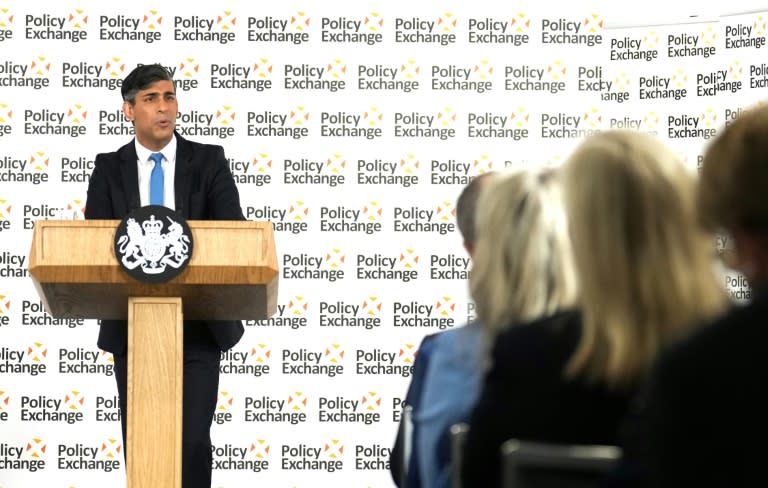Sunak says UK at 'crossroads' but refuses to call election

- Oops!Something went wrong.Please try again later.
- Oops!Something went wrong.Please try again later.
UK Prime Minister Rishi Sunak insisted on Monday that his beleaguered governing Conservative party can win a general election despite polls consistently indicating the opposite, but refused to set a date for the vote.
Sunak mounted a defence of the Tories' 14 years in power and claimed that Britain would be less safe under Keir Starmer's Labour opposition, which is widely tipped to come back to power.
The UK leader said he was "confident" his party would win a fifth consecutive term but conceded that Labour, out of government since 2010, may ultimately inflict defeat.
"I'm clear-eyed enough to admit that, yes, maybe they can depress their way to victory," Sunak said in a speech in central London, accusing Labour of "scaremongering" and "gaslighting".
"But I don't think it will work because at heart we are a nation of optimists," he added, before warning of several dangers himself.
Sunak cited Russia's war in Europe, Iran's firing of missiles in the Middle East and the uncertainty posed by artificial intelligence as threats that needed to be tackled.
He also referred to "authoritarian" states including China and North Korea, Scottish nationalists who want to break away from the United Kingdom and "cancel culture".
"Our country stands at a crossroads," he said.
"I'm convinced that the next few years will be some of the most dangerous, yet most transformational, our country has ever known," Sunak added.
- 'Storms ahead' -
Sunak's speech at the right-wing Policy Exchange think-tank is a clear pre-election pitch to voters, as Labour increasingly puts flesh on the bones of its policies before a manifesto launch.
Its repeated attacks on Starmer also gave an indication of a potentially bitter and personal election battle ahead.
But Sunak refused again to be drawn on when he would call the vote, repeating his well-trodden line that he was aiming for the second half of the year.
He can go to the polls no later than January 2025.
Labour has enjoyed double-digit leads over the Tories in surveys since the disastrous short-lived premiership of Liz Truss that ended in October 2022, and inflicted heavy losses on the Conservatives in local elections earlier this month.
The opposition -- overhauled since Starmer took over in the aftermath of Boris Johnson's election landslide for the Conservatives in 2019 -- has pledged to run the economy responsibly and hopes to match Sunak's recent pledge to raise defence spending to 2.5 percent of GDP.
But the prime minister argued that only his party can protect Britons' safety and financial security, even after a decline in defence spending from 2010 to 2016 and the financial meltdown caused by Truss.
"There are storms ahead. The dangers are all too real," said Sunak, a former finance minister.
"But Britain can feel proud again. Britain can feel confident again. Because with bold action and a clear plan, we can and we will create a secure future."
Asked about Sunak's speech, Starmer said security would be the "first priority" of a Labour administration.
He said the choice at the ballot box would be between "a changed Labour Party that puts the country first and party second" and "the chaos and division" of the Conservatives.
pdh/phz/gil

